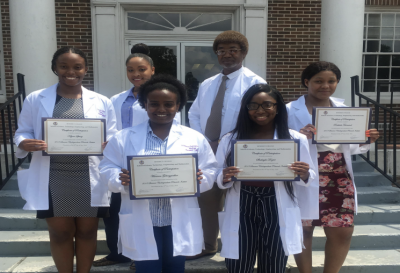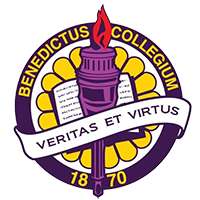Biology, Chemistry and Environmental Health Sciences Department
Department Contact
Dr. Larry Lowe
Department Chair
Email: Larry.Lowe@benedict.edu
Phone: (803) 705-4573
Ms. Tagliaferri Griffin
Administrative Assistant
Email: Tagliaferri.Griffin@benedict.edu
Office Phone: (803) 705-4800
Biology, Chemistry & Environmental Degrees
The Biology, Chemistry, and Environmental Health Sciences Department is committed to producing leaders in the STEM fields. Recognizing the crucial role in science, the Biology, Chemistry and Environmental Health Sciences Department provides research opportunities to all interested and qualified students as part of their undergraduate education.
With a bachelor of science in biology, you’ll learn about the principles common to all living things, studying topics like botany, zoology, anatomy, physiology, and genetics.
Programs of Study
Careers in Biology
Many students get their graduate degrees and become doctors, dentists, veterinarians, pharmacists, therapists and so on. There are also a range of opportunities for graduates with their bachelor’s degree.
- Research scientist
- Biotechnologist
- Marine Biologist
- Pharmacologist
- Genetic Counselor
- Health Educator
- Laboratory Technician
- Forensic Scientist
- Food Scientist
With a bachelor’s degree in chemistry, you’ll learn through on-campus classes and hands-on labs. Study topics like atomic structure, chemical bonding, and chemical equations.
Careers in Chemistry
- Clinical Lab Scientist
- Chemistry Teacher
- Forensic or Materials Scientist
- Toxicologist
- Pharmacologist
- Geochemist
- Food Technologist
- Scientific Writer
- Patent Examiner
With an environmental health science degree, you’ll learn about pollution in water, air, and soil and adverse health effects.
Careers in Environmental Health Science
- Environmental Health and Safety Specialist
- Environmental Health Technician
- Air Pollution Analyst
- Corporate Health and Safety Director
- Food Safety Inspector
- Health and Safety Engineer
- OSHA Inspector
- Environmental Toxicologist
Get Your Bachelor's of Science (BS) Degree
Biology Degree
With a bachelor of science in biology, you’ll learn about the principles common to all living things, studying topics like botany, zoology, anatomy, physiology, and genetics.
Common courses:
- General Biology
- Biology Lab
- Medical Terminology
- Human Anatomy & Physiology
- Immunology
Many students get their graduate degrees and become doctors, dentists, veterinarians, pharmacists, therapists and so on. There are also a range of opportunities for graduates with their bachelor’s degree.
- Research scientist
- Biotechnologist
- Marine Biologist
- Pharmacologist
- Genetic Counselor
- Health Educator
- Laboratory Technician
- Forensic Scientist
- Food Scientist
Chemistry Degree
With a bachelor’s degree in chemistry, you’ll learn through on-campus classes and hands-on labs. Study topics like atomic structure, chemical bonding, and chemical equations.
Common courses:
- Principles of Chemistry
- Fundamentals of Radiochemistry
- Scientific Writing
- Organic Chemistry
- Clinical Lab Scientist
- Chemistry Teacher
- Forensic or Materials Scientist
- Toxicologist
- Pharmacologist
- Geochemist
- Food Technologist
- Scientific Writer
- Patent Examiner
Environmental Health Science Degree
With an environmental health science degree, you’ll learn about pollution in water, air, and soil and adverse health effects.
Common courses:
- Soil & Hazardous Waste Control
- Air Pollution Control
- Industrial Hygiene
- Disease Vectors and Control
- Environmental Health and Safety Specialist
- Environmental Health Technician
- Air Pollution Analyst
- Corporate Health and Safety Director
- Food Safety Inspector
- Health and Safety Engineer
- OSHA Inspector
- Environmental Toxicologist

Apply Today
Start your application today. Join the Biology, Chemistry, and Environmental Department and Tiger Nation!
Request Info
Want to learn more about our South Carolina campus and the Benedict College experience?
Pre-Health Studies
Interested in a career in medicine, dentistry, optometry, osteopathy, veterinary medicine, pharmacy or the allied health professions? We recommend majoring in biology.
Whatever your career goals, you can rely on advisors within the Biology, Chemistry and Environmental Science Department to guide you. Plus, you can take advantage of our many academic clubs on campus, like the pre-health club.

Why Choose an HBCU?
HBCUs produce 27 precent of African Americans with STEM degrees even though they only make up 3 percent of the country’s colleges. Excel in biology, chemistry, and environmental health and science at a southern HBCU in Columbia, SC.
Get Started
Wherever you are in the process, we’re here to help! Ready to apply? Get started today. Want more information? We’re happy to schedule a visit with you or send you more information.


